Features of adjusting plastic doors
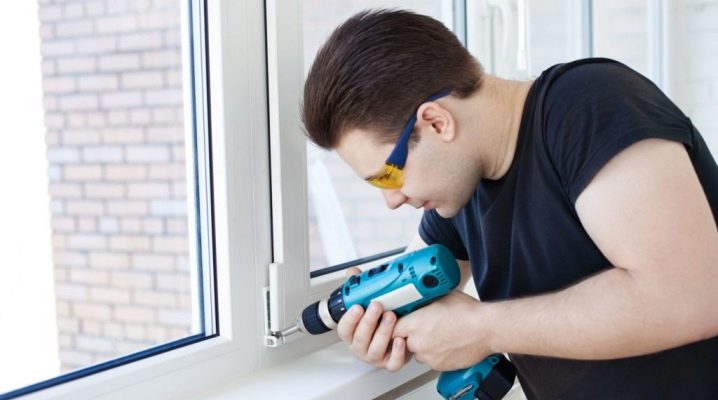
Plastic doors quickly burst into the domestic market. They attracted buyers with their appearance, relatively democratic cost and a huge amount of functionality. But, like any mechanism, a plastic door may experience certain malfunctions.
Most common problems
Due to the fact that the number of owners of plastic doors is steadily growing, there is accordingly statistics of calls to the repair department. Thus, the following picture of the main problems emerges:
- Most often, customers complain that the door sank... Such cases are especially common in those rooms where the door is open for most of the day. The lower part of the door leaf begins to shuffle the threshold or floor, there are difficulties with closing. Small products are less susceptible to this scourge. Especially you need to be attentive to those people who have installed burglar alarm sensors. At the moment the door sags, it is highly likely that it will be impossible to arm the object.
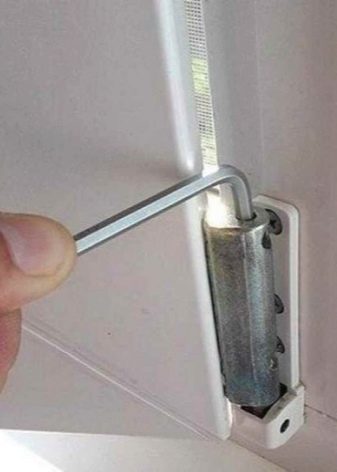
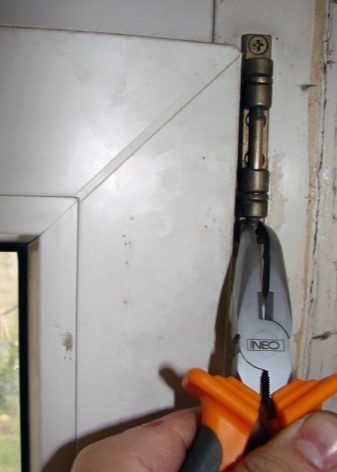
- The second most popular defect is called creak... The door creaks the moment it is opened. This is especially damaging if there are small children in the family who can be woken up by any noise.
- At the door mounted in the balcony block, the seal may come off... In this regard, a situation arises, especially in the winter period, when cold air freely penetrates into the dwelling.
- Cheap castle at the entrance groups in the cold it can even jam. In this case, it will be possible to get inside only after the arrival of specialists. A similar situation can also occur if the handle opening mechanism becomes unusable.
- The least likely to occur problems with the door closer, the blocker and several people note that there is a backlash with the swing-out opening system. Backlash is a free play, due to which the rattling of the door can be heard.
The more mechanisms a product has, the higher the chance that something will fail. The door made of metal-plastic is no exception.
All problems are fixed in a few minutes with a small number of tools that are available in almost every family.
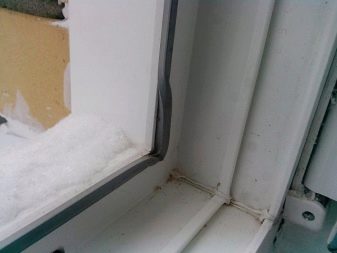
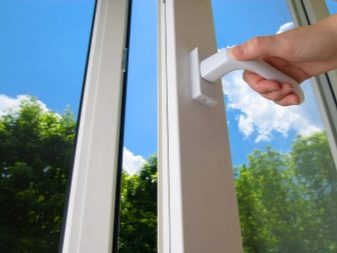
Required tools
First of all, you should make sure that the warranty period has really expired. In recent years, some companies have issued a warranty for fittings for several years. In addition, every year you can call a specialist for preventive maintenance, if this clause is in the contract. If prevention is carried out regularly, then all problems are eliminated in a timely manner.
But if the warranty period has already come to an end, and there is no desire to contact a third-party specialist, then Phillips screwdrivers (or a screwdriver) and hex keys should be prepared. In some cases, you will need pliers and regular lube.
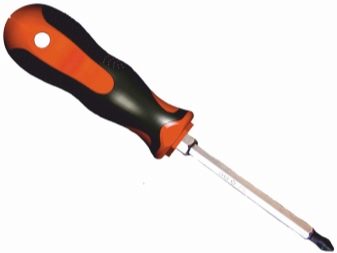
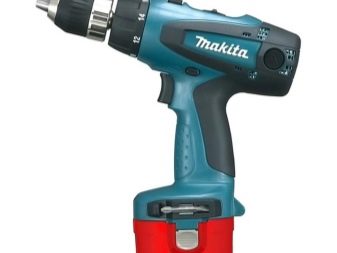
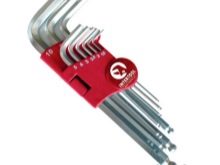
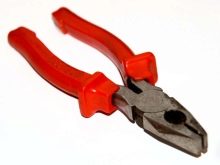
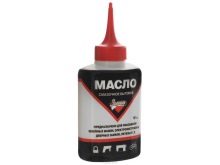
Fittings
The main thing in a plastic door is not a profile, but its metal "filling".
Before moving on to ways to solve certain problems, you should consider what accessories are available for the PVC profile door. Which part will have to be dealt with. This could be:
- Closer. It is a device designed for smooth door movement. In some rooms, thanks to him, the plastic door fits snugly to the jamb, and therefore keeps the warmth in the room.
- A pen. Depending on the design, it can be with or without a built-in lock.
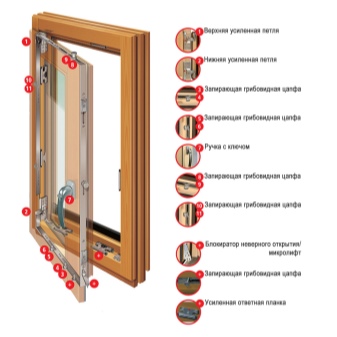
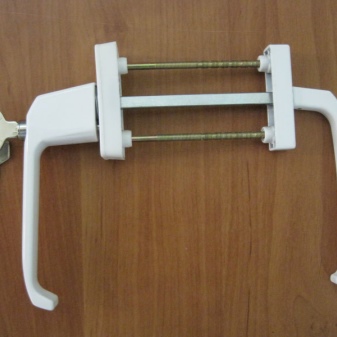
- Lock. It is most often found in both street and office entrance doors. Its main purpose is known to everyone - it is to lock the door.
- Hinges. It is a well-known fact that their main task is to fix the door leaf in the frame. But also with their help, the door is opened and closed. Unlike the hinges in iron doors, the hinges in the plastic door are directly equipped with an adjusting mechanism.
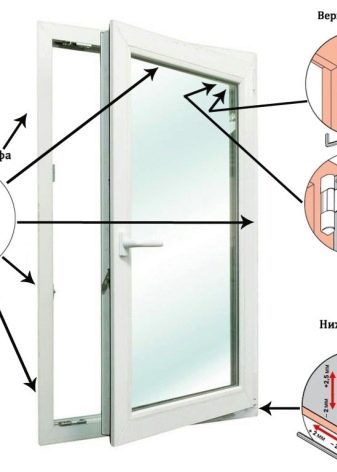
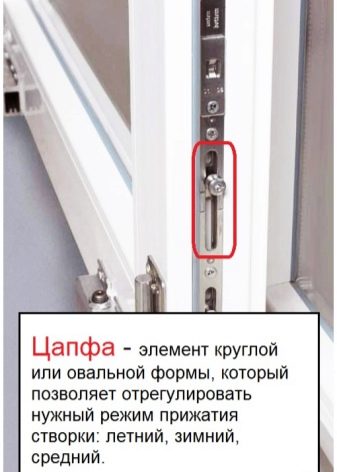
- Trunnions and other remaining mechanism. All this is located around the entire perimeter of the door leaf. The counterpart is located on the frame. Directly the pins are designed to adjust the contact force - clamping. The longest metal part of the door leaf functions with a handle. When opening or closing the handle, all additional parts are activated that are responsible for fixing or positioning the plastic door.

- Separately, I would like to note the seal. Over time, the glue on which it is attached may come off, which means that it will need to be replaced. The seal prevents noise and cold from entering the room. Most often made of rubber or silicone. Does not crack in the cold, is not afraid of high temperatures and ultraviolet radiation.
These were named the most visible components, but there are a lot of other small steel parts, all together they are responsible for the well-coordinated work of the plastic door.
How to adjust correctly: instructions
Ideally, any man should have knowledge of door adjustment. And it does not matter what kind of door we are talking about - the entrance, interior or balcony. And even more so, the principle of its operation is not important, whether the opening system is conventional or swing-out.
In some cases, a pencil lead from a simple pencil helps from squeaking, or a small piece of graphite is placed under the hinges. This method helps if the extraneous noise is emitted by the loops themselves.
But most often the problem is inside the door leaf. To eliminate it, you will have to lubricate the hinges with machine oil; it is easiest to perform this operation with the doors fully open. It probably doesn't make sense to describe in detail the procedure for applying machine oil. Any person has either lubricated it himself sometime, or has seen how others do it. Even if there is no experience in this matter, everything is clear on an intuitive level.
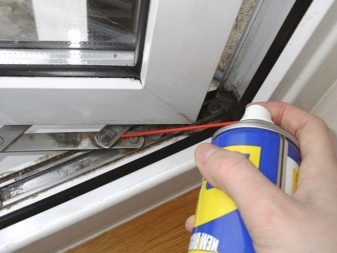
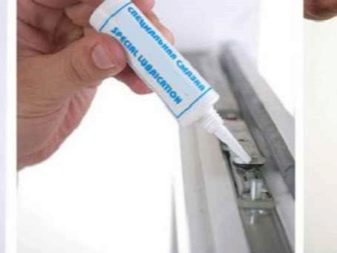
Of course, installers of metal-plastic products do not go to the facility with machine or any other oil. In a professional environment, for these purposes, a WD-40 can is used, referred to in the male environment as "vadashka". Any car owner is familiar with him.
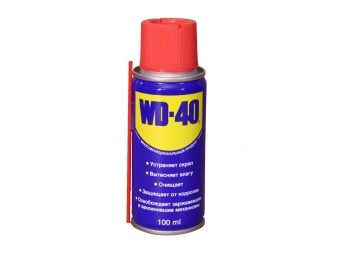

In all other cases, you cannot do without tools, but any adult can do this work independently.
Do not postpone the repair of metal-plastic doors for the winter. Not only can some parts break down due to mechanical efforts in winter, but also at low temperatures fingers can be frostbitten, especially when it comes to a street door. And when it comes to repairing a balcony door, the result can be the same.
Adjustment of plastic doors starts with a hex key. The hex key is inserted into a hole located either on the product's hinges, or in the top or center of the door. In some designs, you can get to it after first removing the plastic cover from the canopies. The adjustment can be both horizontal and vertical.

The lower and upper hinges have two control holes each. The hardest to reach is the hole located in the corner of the lower hinges.If the hinges fit snugly against the doorframe, then you have to sweat a lot to get to it.
It makes sense to perform actions with the lower hinges when the door begins to touch the threshold. When the hex key is turned to one of the sides, the door is either raised or, conversely, lowered. By the way, these recommendations are also suitable in cases where dents appear on the seal.
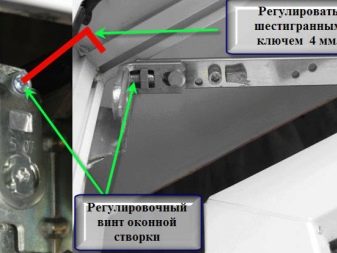
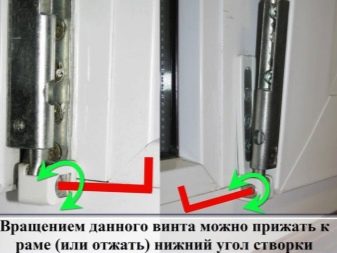
In cases where the door has already sagged significantly, a horizontal setting is suitable. Most often this happens under the influence of the own gravity of the metal-plastic. Only this time, all work must be carried out in the upper part of the canvas.
It is first necessary to unscrew the screws in the upper hinges, and remove the decorative plastic, if it is provided for by the design. After that, you can find a metal component with a screw, which is responsible for the ability to adjust the door to the left or right. When you turn the hexagon clockwise or counterclockwise, the product moves. You can align it exactly to the millimeter.
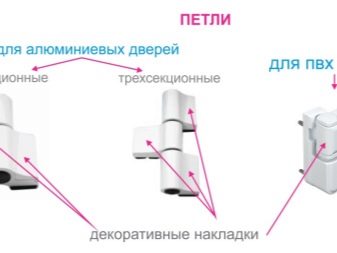
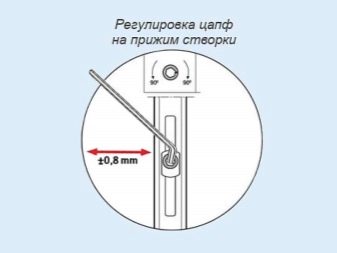
If it is difficult to align the misalignment, the horizontal screws should be loosened and adjusted. In this case, it will be easier to align the door in height, and the time spent will not exceed ten minutes.
Many remember from the school curriculum that plastic expands at high temperatures. By the way, this affects plastic doors in a certain way. In particular, experts recommend to weaken the pressure in the summer, and not to forget to strengthen it in the winter. This contributes to solving problems with the appearance of drafts.
Using a hex wrench, tighten or, conversely, loosen a special mechanism - a trunnion. When you need to loosen - you should turn the notch towards yourself, otherwise - vice versa.
If the design of the plastic door does not provide for the ability to adjust the trunnion with a hexagon, then the clamp can be adjusted using pliers or a wrench. With a parallel arrangement of the trunnion, the clamp will be weak. If you set the perpendicular position, the clamping action will be strong.
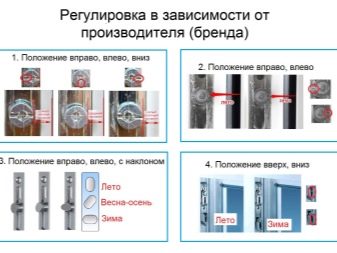
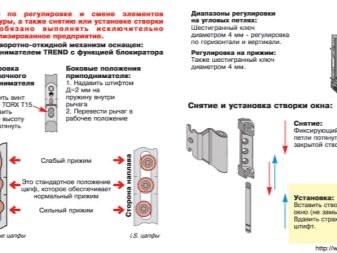
In order for the door to close well, it is enough to adjust the operation of the mechanism. Judging by the above, you can only tighten the hinges yourself with a hex wrench and a few minutes of free time.
Latch, handle or lock breakages are often not repaired. It's easier to buy a new mechanism and replace it. More detailed information about this is provided in a special section.
You can learn how to adjust a plastic door with your own hands from this video.
Diy installation diagram
A screwdriver or Phillips screwdriver is sufficient to replace the lock. If it is necessary to repair a plastic balcony door, then in such structures, the lock is most often embedded in the handle, it turns out that replacing the handle will make the lock work.
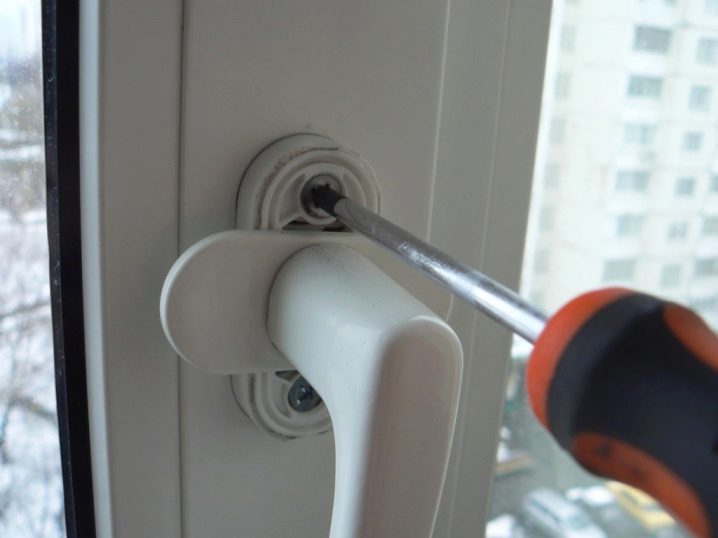
The handle can be replaced in a few steps:
- We move aside the decorative plastic. Self-tapping screws are hidden under it, which attach the handle to the door leaf.
- Using a screwdriver or screwdriver, unscrew the screws and take out the handle.
- We install a new mechanism, purchased in advance in a hardware store.
- It remains only to tighten the screws and return the decorative plastic to its original position.
Replacing the lock
Otherwise, the lock in the entrance plastic door is replaced. The thing is that the lock and handle in such products work separately from each other. But even here it will be enough to have a screwdriver.
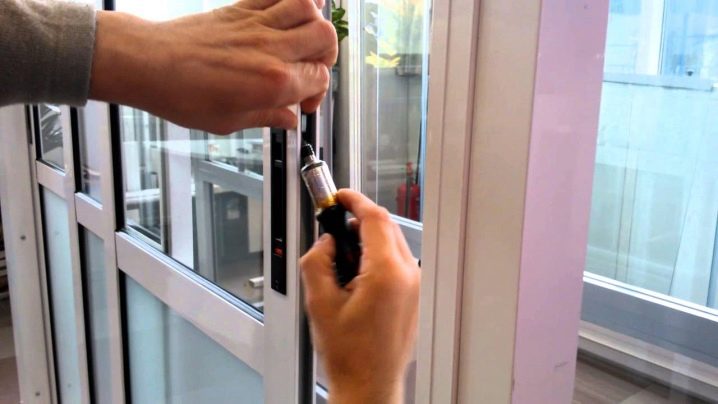
First of all, you need to figure out what type of lock is installed. To date, two options are widely used - with and without a latch. Most often, a latch lock is ordered when there is a need to fix the door in the closed position.
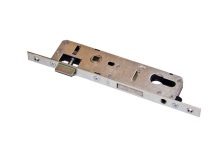


Locks are of two types - single-point and multi-point.Single-point locks, unlike multi-point ones, have only one locking point. As a result, the door leaf does not fit snugly to the surface. Multi-point ones have much more reliable protection, since they "stick" into the door frame from three sides.
By the way, and depending on the way the door is opened, there are different types of latches - either latch or roller. Fale is used when opening the door by pressing the handle, and roller, when the handle is pulled towards itself in the open position.
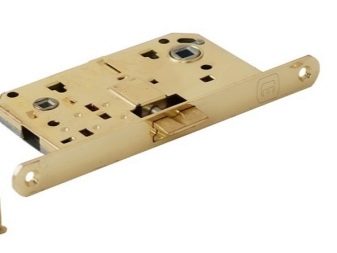
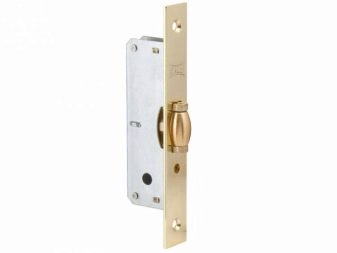
But back to replacing the lock. First, remove the metal plate that protects the product from unauthorized interference. If a certain part has failed, for example, a lock cylinder, then it is replaced. Of course, there is no need to replace other parts. In more advanced cases, a similar procedure will be required as with replacing the handle described above.
Loops rarely fail. Their design, made of metal alloys, is so reliable that it serves, without knowing the repair, for several decades. It may be required only if the defective product originally left the factory. Or, if the weight of the door leaf does not correspond to the specifications.
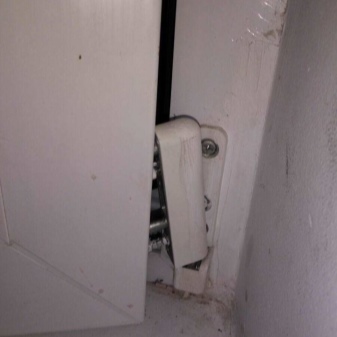
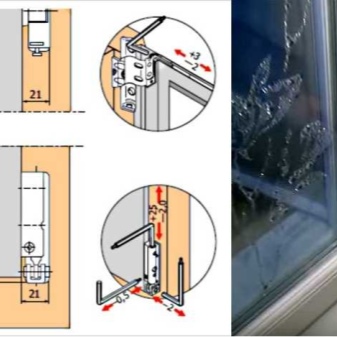
It doesn't matter at all whether you replace the hinge on a wooden door or the hinge with a plastic one. The procedure may differ only in detail. For metal-plastic, the first thing to do is to remove the decorative caps. They play not only an aesthetic role, but also protect the metal from moisture ingress.
And then you need:
- Knock out the axle mechanism. To do this, take a hammer or mallet. This work is done very carefully, the door should be ajar.
- After the appearance of a small metal part, it should be grasped with pliers (or use pliers) and pulled down.
- Tilting the door towards you and slightly lifting it (literally to the height of the pin), remove it from its hinges.
- We unscrew the old hinges and, using the instructions, mount the new ones.
It remains only to return the door to its usual state. It is advisable to carry out this operation together, remember that the plastic door weighs a lot.
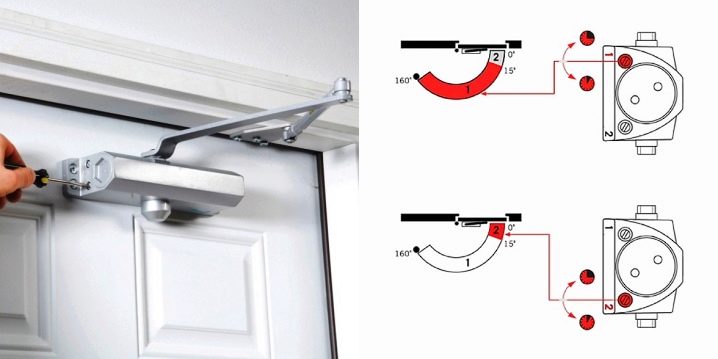
The process of replacing overhead closers is also simple. The old mechanism is removed and its exact copy is installed. First, the box is mounted, and then the lever. Having connected the body to the lever, you can start adjusting the closer. By loosening or, conversely, tightening the screws located at the end of the case. Thus, the closing speed and pressure are regulated. Floor and hidden closers have not received widespread use today, so it makes no sense to dwell on them in more detail.
If you have to replace the plastic door seal, then before sending it to the hardware store it will be useful to remove the old one with a flat screwdriver. The gasket is adhered to the glue in the corresponding groove, so there should be no difficulties.
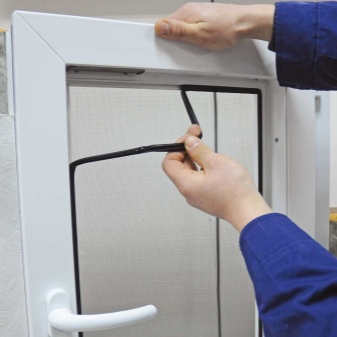
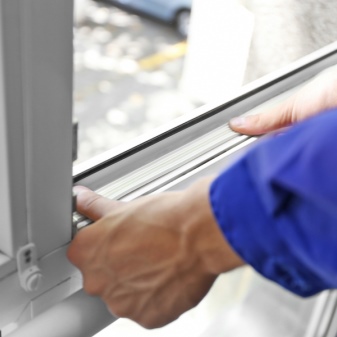
Having a sample on hand, you can be guaranteed to purchase the desired option. It remains only to clean the surface from excess glue, apply a new layer along the entire length and fix the seal. At the same time, it should not sag and stretch.
Overweighing the door leaf

It would seem that people were lucky, some ordered the installation of plastic doors a few years ago, others became the happy owners of new square meters, where metal-plastic doors were already installed. But years pass, there is a desire to make not a cosmetic, but a major overhaul of one of the rooms. And at this very moment there is a realization that it would not be superfluous to outweigh the door from one side to the other. Quite often, it is this problem that concerns the balcony door.
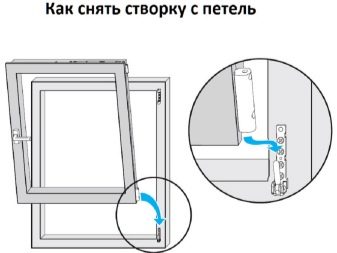
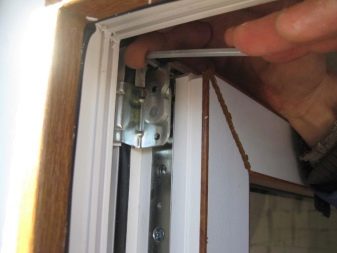
This procedure begins by removing the handles and door leaf from the hinges.
This procedure was described earlier, so we immediately move on to the following points:
- Remove the remaining hardware from the door leaf, including the mounted lower hinges. To do this, you need to use screwdrivers or a screwdriver. There shouldn't be any special difficulties. The main thing to remember is that the removed parts are best laid out in the same way as they were installed. And it is especially important not to break the plastic clips, otherwise they will have to be bought.
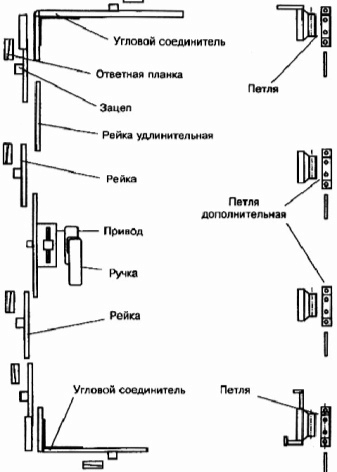
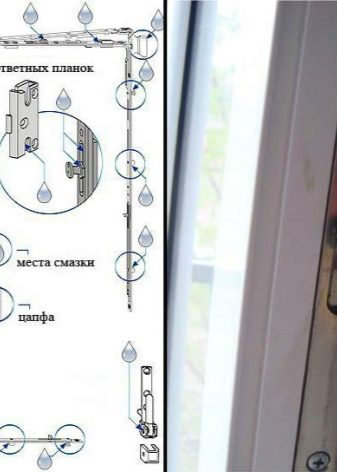
It is good to know that fittings vary from manufacturer to manufacturer, and each manufacturer has a different series.
- Almost all details are symmetrical, it follows that their mirror rearrangement is possible. In addition to the part called the scissors on the frame, you will have to buy it. It is installed at the top of the door. It can be either left or right. Its purpose is to fold back the plastic product.
- After all the accessories have been removed, we rearrange it in a mirror-like manner. The main thing is to correctly mark the position of the lower loops. At the same time, do not forget about the handle, which will also change its position.
- To drill a hole for the handle, you need a multi-tool with a special attachment. It can be used to cut a neat rectangular hole without damaging the rest of the door leaf. An ordinary chisel can be a replacement for a multi-tool, but plastic processing will take more time.
- For the correct alignment of the fittings, the trunnions should be set exactly in the center. This will save both time and nerves. You should use the instructions and diagrams from the manufacturer of the accessories.


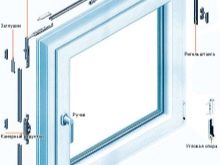
- The connection of the scissors on the frame with the scissors on the sash is possible thanks to the runners, which are inserted into the guides. The second locking mechanism is the special holes that are superimposed on the plastic sleeve.
- With a tilt-and-turn door opening system, there is a mechanism responsible for blocking. By changing the position of the tongue, it becomes possible to install it when the door is outweighed.
- When the door leaf is ready, the fittings should be transferred to the door frame as well. Observing the position of the parts down to the millimeter, otherwise nothing will work.
- The bar, which is responsible for holding the door during the swing-out system, can be symmetrical or asymmetrical. The symmetrical plank will fit right and left. When transferring it, you should carefully study the detail.
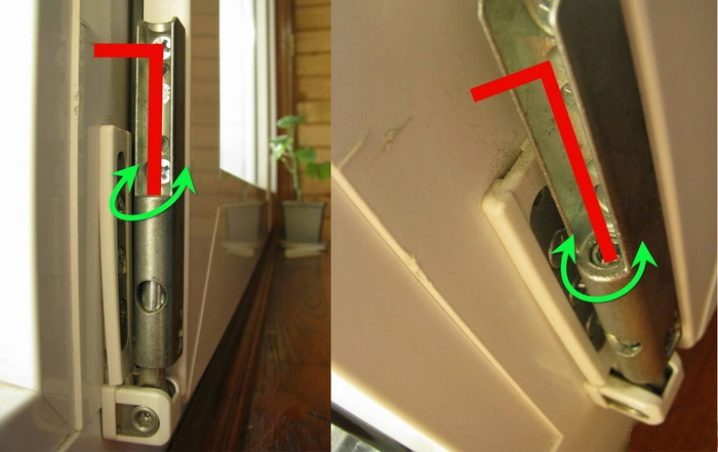
- The alignment of the plastic door is possible with a hex key. This procedure is discussed in more detail in the previous sections.
- The holes formed on the site of the former location of the handle can be decorated with a special plastic insert, which is called the socket.
- And the holes from the hinges should be covered with white liquid nails or filled with liquid plastic.
This process will take a certain amount of time. The easiest way is to outweigh a door with a conventional opening system, because many of the details that are provided for in the design of the door leaf with a swing-out system, in this case, are absent.
Mirror overhanging of the balcony block
Although quite rarely people resort to outweighing the door leaf, there are still such examples. By analogy, the mirror arrangement of the balcony block is being redone. But remember that this may require permission, as part of the wall that is located under the window is to be dismantled.
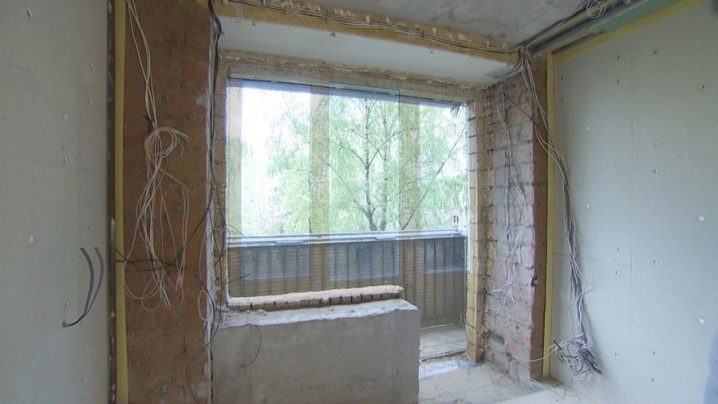
We remove the plastic door and window structures from the hinges using the previously described method. Using an ordinary screwdriver, carefully remove the slopes, corners and the door frame, which is held on the foam.
With permission in hand, we remove part of the wall. The easiest way to clean is brickwork, you will have to tinker a little with a reinforced concrete slab. As a result, you should get a rectangular opening.
Since the broken part of the wall is small, it is advisable to use bricks for the construction of a new part. Having carried out all the measurements in advance, we get an absolutely equal symmetrical version of the balcony block. Impost is a plastic part of a door frame, resembles a constructor and is carried over in no time.


It remains only to outweigh the door and insert the window. The procedure is already familiar. Then we return the slopes and corners to their original place, and with the help of a sealant and a clean cloth we cover up the cracks.
The described transformations may seem very complicated to some. And not everyone has such a need. But a huge number of people want to equip the door leaf with a tilt-and-turn opening mechanism.
Modernization of the door leaf
The heating season lasts most of the year, and it is quite natural that during the period of spring thaws there is a desire to ventilate the room. Most often, the design of the door allows only opening it wide open or leaving the door slightly ajar. In this case, cold air enters the room evenly, including in the lower part. The situation is different when opening the door in the swing-out system. It opens only at the top and cold air remains in the upper layers.

To change the design of the opening of metal-plastic, it will be necessary to remove the door from the hinges again. After examining the upper part of the fittings or the documents for the product, you can go to the hardware store. It is enough to know the size of the hardware groove or the name of the hardware itself. Consultants will offer the desired option without any problems.
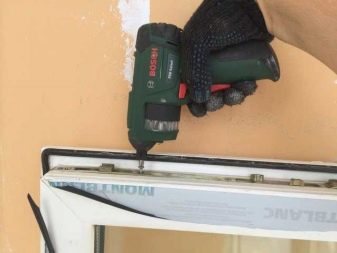
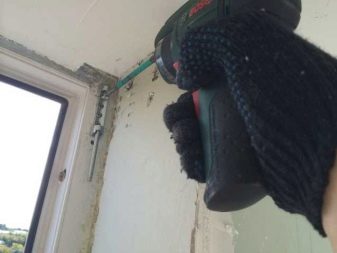
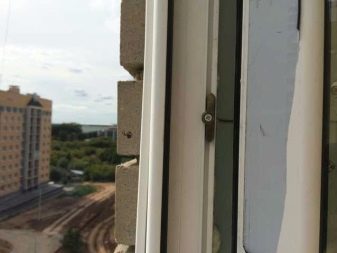
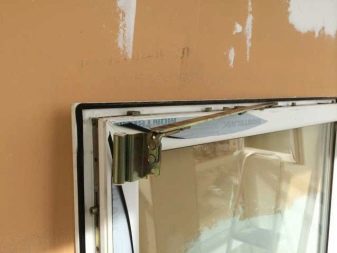
Using a screwdriver, remove the upper hardware elements from the door, which we no longer need. You should start with the top loops and the extension cord.
Having dealt with the sash, we move on to the frame, where you have to dismantle the middle clamp and the upper hinge. Instead of the old hinge, a new one, specially designed for the swing-out opening system, is attached.
On the sash, install the middle lock and the sash part of the scissors. You should periodically refer to the diagrams and instructions supplied with the fittings. Even specialists often look at them, there is nothing reprehensible in this: after all, the mechanism is rather complicated.
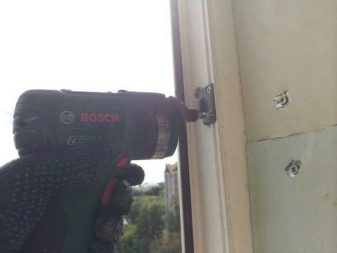
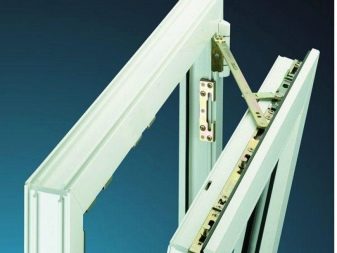
The next step is to install the scissors on the frame and the counterpart at the very bottom of the door frame. Depending on the height of the plastic door, additional strikers are installed. This completes the installation of the system; all that remains is to adjust it with a hex wrench.
In conclusion, I would like to note that a plastic door begins with a measurement. If the measurer made the correct measurements, and there was no marriage at the plant, and the installers did their job efficiently, then it will serve faithfully for more than a dozen years. Of course, with proper use. But if someday any part does fail, it will not be difficult to replace it or lift the sagging door.
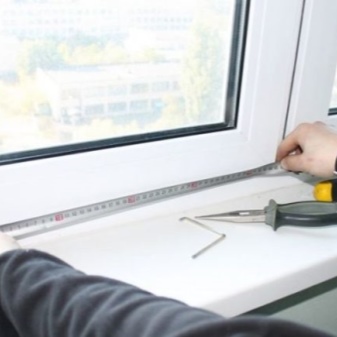
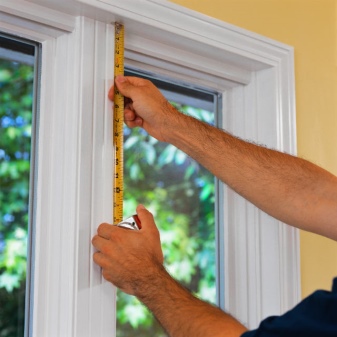













The comment was sent successfully.